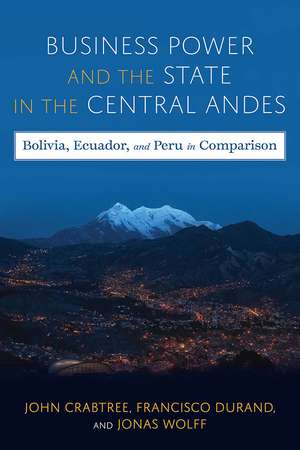Business Power and the State in the Central Andes: Bolivia, Ecuador, and Peru in Comparison: Pitt Latin American Series
Autor John Crabtree, Jonas Wolff, Francisco Duranden Limba Engleză Hardback – 7 noi 2023
This coauthored monograph examines how business groups have interacted with state authorities in the three central Andean countries from the mid-twentieth century through the early twenty-first. This time span covers three distinct economic regimes: the period of state-led import substitutive industrialization from the 1950s through the 1970s, the neoliberalism of the 1980s and 1990s, and the post-neoliberal period since the earlier 2000s. These three countries share many similarities but also have important differences that reveal how power is manifested. Peru has had an almost unbroken hegemony of business elites who leverage their power over areas of state activity that affect them. Bolivia, by contrast, shows how strong social movements have challenged business dominance at crucial periods, reflecting a weaker elite class that is less able to exercise influence over decision-making. Ecuador falls in between these two, with business elites being more fragmented than in Peru and social movements being weaker than in Bolivia. The authors analyze the viability of these different regimes and economic models, why they change in specific circumstances, and how they affect the state and its citizen
Din seria Pitt Latin American Series
-
 Preț: 429.67 lei
Preț: 429.67 lei -
 Preț: 450.40 lei
Preț: 450.40 lei -
 Preț: 355.58 lei
Preț: 355.58 lei -
 Preț: 431.62 lei
Preț: 431.62 lei -
 Preț: 392.66 lei
Preț: 392.66 lei -
 Preț: 388.79 lei
Preț: 388.79 lei -
 Preț: 428.14 lei
Preț: 428.14 lei -
 Preț: 362.33 lei
Preț: 362.33 lei -
 Preț: 393.58 lei
Preț: 393.58 lei -
 Preț: 330.30 lei
Preț: 330.30 lei -
 Preț: 394.57 lei
Preț: 394.57 lei -
 Preț: 389.76 lei
Preț: 389.76 lei -
 Preț: 334.31 lei
Preț: 334.31 lei -
 Preț: 388.79 lei
Preț: 388.79 lei -
 Preț: 396.85 lei
Preț: 396.85 lei -
 Preț: 350.79 lei
Preț: 350.79 lei - 17%
 Preț: 445.11 lei
Preț: 445.11 lei -
 Preț: 388.03 lei
Preț: 388.03 lei -
 Preț: 365.04 lei
Preț: 365.04 lei -
 Preț: 457.11 lei
Preț: 457.11 lei -
 Preț: 471.15 lei
Preț: 471.15 lei - 17%
 Preț: 384.06 lei
Preț: 384.06 lei -
 Preț: 428.14 lei
Preț: 428.14 lei -
 Preț: 389.17 lei
Preț: 389.17 lei -
 Preț: 465.76 lei
Preț: 465.76 lei -
 Preț: 429.89 lei
Preț: 429.89 lei -
 Preț: 392.66 lei
Preț: 392.66 lei -
 Preț: 424.88 lei
Preț: 424.88 lei -
 Preț: 389.38 lei
Preț: 389.38 lei -
 Preț: 432.57 lei
Preț: 432.57 lei -
 Preț: 435.45 lei
Preț: 435.45 lei -
 Preț: 393.58 lei
Preț: 393.58 lei -
 Preț: 354.23 lei
Preț: 354.23 lei -
 Preț: 458.07 lei
Preț: 458.07 lei -
 Preț: 389.76 lei
Preț: 389.76 lei -
 Preț: 363.26 lei
Preț: 363.26 lei -
 Preț: 502.82 lei
Preț: 502.82 lei -
 Preț: 423.91 lei
Preț: 423.91 lei -
 Preț: 395.54 lei
Preț: 395.54 lei -
 Preț: 153.64 lei
Preț: 153.64 lei -
 Preț: 351.72 lei
Preț: 351.72 lei -
 Preț: 383.01 lei
Preț: 383.01 lei -
 Preț: 393.58 lei
Preț: 393.58 lei -
 Preț: 351.55 lei
Preț: 351.55 lei -
 Preț: 351.72 lei
Preț: 351.72 lei -
 Preț: 389.76 lei
Preț: 389.76 lei -
 Preț: 331.86 lei
Preț: 331.86 lei -
 Preț: 358.46 lei
Preț: 358.46 lei -
 Preț: 431.62 lei
Preț: 431.62 lei
Preț: 424.88 lei
Nou
Puncte Express: 637
Preț estimativ în valută:
81.30€ • 83.88$ • 67.85£
81.30€ • 83.88$ • 67.85£
Carte disponibilă
Livrare economică 06-20 martie
Preluare comenzi: 021 569.72.76
Specificații
ISBN-13: 9780822947899
ISBN-10: 0822947897
Pagini: 248
Dimensiuni: 152 x 229 x 28 mm
Greutate: 0.5 kg
Editura: University of Pittsburgh Press
Colecția University of Pittsburgh Press
Seria Pitt Latin American Series
ISBN-10: 0822947897
Pagini: 248
Dimensiuni: 152 x 229 x 28 mm
Greutate: 0.5 kg
Editura: University of Pittsburgh Press
Colecția University of Pittsburgh Press
Seria Pitt Latin American Series
Recenzii
“Insightful, meticulously researched, and timely, Business Power and the State in the Central Andes offers a fresh look at an underresearched, but crucial, factor in the politics of economic development: the role of business power for explaining swings between market- and state-led models.” —Eduardo Silva, Tulane University
“In this ambitious historical and comparative analysis of three South American countries—Peru, Ecuador, and Bolivia—the authors reveal how business elites have exercised structural, instrumental, and discursive power to advance their interests in the context of the transformations wrought by neoliberalism. Anyone interested in the political economy of Latin America’s left and right turns and the challenges of sustaining democracy in unequal societies must read this book.” —Maxwell A. Cameron, University of British Columbia
“We needed this book. Crabtree, Durand, and Wolff worked through the COVID-19 pandemic to bring us a theoretically sophisticated, empirically rich, and comparatively structured work on business power in the central Andes. . . . A required book for scholars of business everywhere.” —Ben Ross Schneider, Massachusetts Institute of Technolog
“In this ambitious historical and comparative analysis of three South American countries—Peru, Ecuador, and Bolivia—the authors reveal how business elites have exercised structural, instrumental, and discursive power to advance their interests in the context of the transformations wrought by neoliberalism. Anyone interested in the political economy of Latin America’s left and right turns and the challenges of sustaining democracy in unequal societies must read this book.” —Maxwell A. Cameron, University of British Columbia
“We needed this book. Crabtree, Durand, and Wolff worked through the COVID-19 pandemic to bring us a theoretically sophisticated, empirically rich, and comparatively structured work on business power in the central Andes. . . . A required book for scholars of business everywhere.” —Ben Ross Schneider, Massachusetts Institute of Technolog
Notă biografică
John Crabtree is research associate at the Latin American Centre at the University of Oxford, associate of the Politics Department at Brookes University in Oxford, and region head for Latin America at Oxford Analytica Ltd.
Francisco Durand was full professor of political science at Pontificia Universidad Católica del Perú and professor emeritus at the University of Texas at San Antonio.
Jonas Wolff is professor of political science with a focus on transformation studies and Latin America at Goethe University Frankfurt as well as executive board member and head of the Intrastate Conflict Department at the Peace Research Institute Frankfurt in Germany.
Francisco Durand was full professor of political science at Pontificia Universidad Católica del Perú and professor emeritus at the University of Texas at San Antonio.
Jonas Wolff is professor of political science with a focus on transformation studies and Latin America at Goethe University Frankfurt as well as executive board member and head of the Intrastate Conflict Department at the Peace Research Institute Frankfurt in Germany.
Extras
tk
